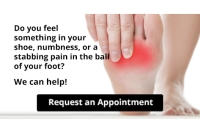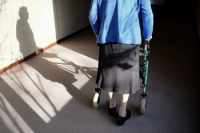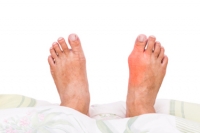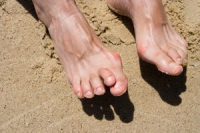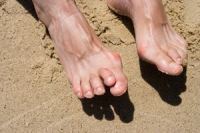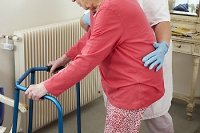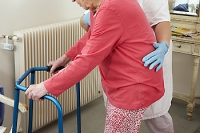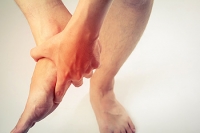
Blog (787)
Why Live with Pain and Numbness in Your Feet?
How Exercise May Help to Prevent Falling
It is beneficial for elderly people to get routine medical examinations throughout the year. This may be helpful in preventing falling episodes, which can be a common occurrence among seniors. Existing medication can be reviewed, in addition to ensuring the legs maintain the strength that is needed to complete daily activities. Performing a gentle exercise and stretching routine may help the body to become stronger, and this often helps to increase flexibility. Additionally, the living environment may have to be readjusted. This can include improving the lighting, removing torn rugs, and installing grab bars in the shower and toilet area. It is important to know how falling may impact the feet, and if you would like more information about how to prevent falling, please schedule an appointment with a podiatrist.
Preventing falls among the elderly is very important. If you are older and have fallen or fear that you are prone to falling, consult with Dr. Kenneth Donovan from Advanced Care Foot and Ankle. Our doctor will assess your condition and provide you with quality advice and care.
Every 11 seconds, an elderly American is being treated in an emergency room for a fall related injury. Falls are the leading cause of head and hip injuries for those 65 and older. Due to decreases in strength, balance, senses, and lack of awareness, elderly persons are very susceptible to falling. Thankfully, there are a number of things older persons can do to prevent falls.
How to Prevent Falls
Some effective methods that older persons can do to prevent falls include:
- Enrolling in strength and balance exercise program to increase balance and strength
- Periodically having your sight and hearing checked
- Discuss any medications you have with a doctor to see if it increases the risk of falling
- Clearing the house of falling hazards and installing devices like grab bars and railings
- Utilizing a walker or cane
- Wearing shoes that provide good support and cushioning
- Talking to family members about falling and increasing awareness
Falling can be a traumatic and embarrassing experience for elderly persons; this can make them less willing to leave the house, and less willing to talk to someone about their fears of falling. Doing such things, however, will increase the likelihood of tripping or losing one’s balance. Knowing the causes of falling and how to prevent them is the best way to mitigate the risk of serious injury.
If you have any questions, please feel free to contact one of our offices located in Warren, Livingston, and Toms River, NJ . We offer the newest diagnostic and treatment technologies for all your foot care needs.
What Can Cause Gout?
Severe pain in the big toe is a common symptom of gout. It is a form of arthritis that attacks the joints in the toes, and additional signs of this condition can include swelling and redness. The risk of getting gout may be increased by having existing medical ailments that can include diabetes, hypertension, and obesity. Outside influences may consist of genetic factors, eating foods that have high purine levels, and drinking excess alcohol. Gout attacks may be prevented by eating healthy foods, and incorporating a gentle exercise program into your daily routine. It is important to drink plenty of water daily, as this may help to lower uric acid levels that can cause gout. If you are afflicted with gout, it is suggested that you are under the care of a podiatrist who can help you to manage this condition.
Gout is a painful condition that can be treated. If you are seeking treatment, contact Dr. Kenneth Donovan from Advanced Care Foot and Ankle. Our doctor will treat your foot and ankle needs.
What Is Gout?
Gout is a form of arthritis that is characterized by sudden, severe attacks of pain, redness, and tenderness in the joints. The condition usually affects the joint at the base of the big toe. A gout attack can occur at any random time, such as the middle of the night while you are asleep.
Symptoms
- Intense Joint Pain – Usually around the large joint of your big toe, and it most severe within the first four to twelve hours
- Lingering Discomfort – Joint discomfort may last from a few days to a few weeks
- Inflammation and Redness -Affected joints may become swollen, tender, warm and red
- Limited Range of Motion – May experience a decrease in joint mobility
Risk Factors
- Genetics – If family members have gout, you’re more likely to have it
- Medications – Diuretic medications can raise uric acid levels
- Gender/Age – Gout is more common in men until the age of 60. It is believed that estrogen protects women until that point
- Diet – Eating red meat and shellfish increases your risk
- Alcohol – Having more than two alcoholic drinks per day increases your risk
- Obesity – Obese people are at a higher risk for gout
Prior to visiting your podiatrist to receive treatment for gout, there are a few things you should do beforehand. If you have gout you should write down your symptoms–including when they started and how often you experience them, important medical information you may have, and any questions you may have. Writing down these three things will help your podiatrist in assessing your specific situation so that he or she may provide the best route of treatment for you.
If you have any questions, please feel free to contact one of our offices located in Warren, Livingston, and Toms River, NJ . We offer the newest diagnostic and treatment technologies for all your foot care needs.
What Is a Hammertoe?
The uncomfortable foot condition that is known as a hammertoe is considered to be a foot deformity. It can occur from genetic factors, or from wearing shoes that do not have adequate room for the toes to move freely in. The joints in the middle toes are typically affected, and can bend downward, which may resemble a hammer. Some patients have calluses that develop on top of the toes, and this may be a result of the toes rubbing against the top of the shoe. It may be beneficial to cease wearing pointed shoes such as high heels. Additionally, mild relief may be found when a protective pad is worn on the impacted toe. Severe hammertoes may cause pain and discomfort, and surgery may be a viable option to permanently straighten the toes. If you are afflicted with a hammertoe, it is suggested that you consult with a podiatrist as quickly as possible who can guide you toward the treatment that is best for you.
Hammertoe
Hammertoes can be a painful condition to live with. For more information, contact Dr. Kenneth Donovan from Advanced Care Foot and Ankle. Our doctor will answer any of your foot- and ankle-related questions.
Hammertoe is a foot deformity that affects the joints of the second, third, fourth, or fifth toes of your feet. It is a painful foot condition in which these toes curl and arch up, which can often lead to pain when wearing footwear.
Symptoms
- Pain in the affected toes
- Development of corns or calluses due to friction
- Inflammation
- Redness
- Contracture of the toes
Causes
Genetics – People who are genetically predisposed to hammertoe are often more susceptible
Arthritis – Because arthritis affects the joints in your toes, further deformities stemming from arthritis can occur
Trauma – Direct trauma to the toes could potentially lead to hammertoe
Ill-fitting shoes – Undue pressure on the front of the toes from ill-fitting shoes can potentially lead to the development of hammertoe
Treatment
Orthotics – Custom made inserts can be used to help relieve pressure placed on the toes and therefore relieve some of the pain associated with it
Medications – Oral medications such as anti-inflammatories or NSAIDs could be used to treat the pain and inflammation hammertoes causes. Injections of corticosteroids are also sometimes used
Surgery – In more severe cases where the hammertoes have become more rigid, foot surgery is a potential option
If you have any questions please contact one of our offices located in Warren, Livingston, and Toms River, NJ . We offer the newest diagnostic and treatment technologies for all your foot and ankle needs.
What Is a Hammertoe?
 The uncomfortable foot condition that is known as a hammertoe is considered to be a foot deformity. It can occur from genetic factors, or from wearing shoes that do not have adequate room for the toes to move freely in. The joints in the middle toes are typically affected, and can bend downward, which may resemble a hammer. Some patients have calluses that develop on top of the toes, and this may be a result of the toes rubbing against the top of the shoe. It may be beneficial to cease wearing pointed shoes such as high heels. Additionally, mild relief may be found when a protective pad is worn on the impacted toe. Severe hammertoes may cause pain and discomfort, and surgery may be a viable option to permanently straighten the toes. If you are afflicted with a hammertoe, it is suggested that you consult with a podiatrist as quickly as possible who can guide you toward the treatment that is best for you.
The uncomfortable foot condition that is known as a hammertoe is considered to be a foot deformity. It can occur from genetic factors, or from wearing shoes that do not have adequate room for the toes to move freely in. The joints in the middle toes are typically affected, and can bend downward, which may resemble a hammer. Some patients have calluses that develop on top of the toes, and this may be a result of the toes rubbing against the top of the shoe. It may be beneficial to cease wearing pointed shoes such as high heels. Additionally, mild relief may be found when a protective pad is worn on the impacted toe. Severe hammertoes may cause pain and discomfort, and surgery may be a viable option to permanently straighten the toes. If you are afflicted with a hammertoe, it is suggested that you consult with a podiatrist as quickly as possible who can guide you toward the treatment that is best for you.
Hammertoe
Hammertoes can be a painful condition to live with. For more information, contact Dr. Kenneth Donovan from Advanced Care Foot and Ankle. Our doctor will answer any of your foot- and ankle-related questions.
Hammertoe is a foot deformity that affects the joints of the second, third, fourth, or fifth toes of your feet. It is a painful foot condition in which these toes curl and arch up, which can often lead to pain when wearing footwear.
Symptoms
- Pain in the affected toes
- Development of corns or calluses due to friction
- Inflammation
- Redness
- Contracture of the toes
Causes
Genetics – People who are genetically predisposed to hammertoe are often more susceptible
Arthritis – Because arthritis affects the joints in your toes, further deformities stemming from arthritis can occur
Trauma – Direct trauma to the toes could potentially lead to hammertoe
Ill-fitting shoes – Undue pressure on the front of the toes from ill-fitting shoes can potentially lead to the development of hammertoe
Treatment
Orthotics – Custom made inserts can be used to help relieve pressure placed on the toes and therefore relieve some of the pain associated with it
Medications – Oral medications such as anti-inflammatories or NSAIDs could be used to treat the pain and inflammation hammertoes causes. Injections of corticosteroids are also sometimes used
Surgery – In more severe cases where the hammertoes have become more rigid, foot surgery is a potential option
If you have any questions please contact one of our offices located in Warren, Livingston, and Toms River, NJ . We offer the newest diagnostic and treatment technologies for all your foot and ankle needs.
Plantar Warts Can Be Treated!
Plantar Warts Can Be Treated!
Foot Stretches for Seniors
It can be incredibly beneficial for elderly patients to regularly perform foot stretches. When a senior patient's feet are strong, as well as flexible, it may make them more likely to avoid accidentally falling. By performing stretches, you may increase your blood circulation, as well as improve your range of motion, muscle strength, and balance. One example of a foot stretch that is easily practiced is called an ankle rotation. This can be done by sitting up straight in a chair, and resting your ankle on the opposite knee. Begin rotating your ankle first clockwise, then counterclockwise, then you may switch ankles. For an additional stretch, make sure your toes are pointed straight during this exercise. For more advice on elderly foot care and low-impact exercises for the feet, it is suggested that you speak with your local podiatrist.
Exercising your feet regularly with the proper foot wear is a great way to prevent injuries and build strength. If you have any concerns about your feet, contact Dr. Kenneth Donovan from Advanced Care Foot and Ankle. Our doctor can provide the care you need to keep you pain-free and on your feet.
Exercise for Your Feet
Exercise for your feet can help you gain strength, mobility and flexibility in your feet. They say that strengthening your feet can be just as rewarding as strengthening another part of the body. Your feet are very important, and we often forget about them in our daily tasks. But it is because of our feet that are we able to get going and do what we need to. For those of us fortunate enough to not have any foot problems, it is an important gesture to take care of them to ensure good health in the long run.
Some foot health exercises can include ankle pumps, tip-toeing, toe rises, lifting off the floor doing reps and sets, and flexing the toes. It is best to speak with Our doctor to determine an appropriate regimen for your needs. Everyone’s needs and bodies are different, and the activities required to maintain strength in the feet vary from individual to individual.
Once you get into a routine of doing regular exercise, you may notice a difference in your feet and how strong they may become.
If you have any questions please feel free to contact one of our offices located in Warren, Livingston, and Toms River, NJ . We offer the newest diagnostic and treatment technologies for all your foot and ankle needs.
Foot Stretches for Seniors
 It can be incredibly beneficial for elderly patients to regularly perform foot stretches. When a senior patient's feet are strong, as well as flexible, it may make them more likely to avoid accidentally falling. By performing stretches, you may increase your blood circulation, as well as improve your range of motion, muscle strength, and balance. One example of a foot stretch that is easily practiced is called an ankle rotation. This can be done by sitting up straight in a chair, and resting your ankle on the opposite knee. Begin rotating your ankle first clockwise, then counterclockwise, then you may switch ankles. For an additional stretch, make sure your toes are pointed straight during this exercise. For more advice on elderly foot care and low-impact exercises for the feet, it is suggested that you speak with your local podiatrist.
It can be incredibly beneficial for elderly patients to regularly perform foot stretches. When a senior patient's feet are strong, as well as flexible, it may make them more likely to avoid accidentally falling. By performing stretches, you may increase your blood circulation, as well as improve your range of motion, muscle strength, and balance. One example of a foot stretch that is easily practiced is called an ankle rotation. This can be done by sitting up straight in a chair, and resting your ankle on the opposite knee. Begin rotating your ankle first clockwise, then counterclockwise, then you may switch ankles. For an additional stretch, make sure your toes are pointed straight during this exercise. For more advice on elderly foot care and low-impact exercises for the feet, it is suggested that you speak with your local podiatrist.
Exercising your feet regularly with the proper foot wear is a great way to prevent injuries and build strength. If you have any concerns about your feet, contact Dr. Kenneth Donovan from Advanced Care Foot and Ankle. Our doctor can provide the care you need to keep you pain-free and on your feet.
Exercise for Your Feet
Exercise for your feet can help you gain strength, mobility and flexibility in your feet. They say that strengthening your feet can be just as rewarding as strengthening another part of the body. Your feet are very important, and we often forget about them in our daily tasks. But it is because of our feet that are we able to get going and do what we need to. For those of us fortunate enough to not have any foot problems, it is an important gesture to take care of them to ensure good health in the long run.
Some foot health exercises can include ankle pumps, tip-toeing, toe rises, lifting off the floor doing reps and sets, and flexing the toes. It is best to speak with Our doctor to determine an appropriate regimen for your needs. Everyone’s needs and bodies are different, and the activities required to maintain strength in the feet vary from individual to individual.
Once you get into a routine of doing regular exercise, you may notice a difference in your feet and how strong they may become.
If you have any questions please feel free to contact one of our offices located in Warren, Livingston, and Toms River, NJ . We offer the newest diagnostic and treatment technologies for all your foot and ankle needs.
What Does Foot Pain Indicate?
Foot pain is considered to be a common ailment among many people. It can include pain in the toes, heel, and arch areas, which may be indicative of serious foot conditions. Toe pain can be a symptom of certain types of arthritis, bunions, or it may originate from an ingrown toenail. If there is pain in the ball of the foot, it may be linked to a condition that is referred to as Morton’s neuroma, which impacts the nerves of the foot. A common form of pain and discomfort in the heel can be connected to plantar fasciitis, heel spurs, or possibly from an Achilles tendon injury. If you are experiencing foot pain for any reason, it is strongly advised that you are under the care of a podiatrist.
Foot Pain
Foot pain can be extremely painful and debilitating. If you have a foot pain, consult with Dr. Kenneth Donovan from Advanced Care Foot and Ankle. Our doctor will assess your condition and provide you with quality foot and ankle treatment.
Causes
Foot pain is a very broad condition that could be caused by one or more ailments. The most common include:
- Bunions
- Hammertoes
- Plantar Fasciitis
- Bone Spurs
- Corns
- Tarsal Tunnel Syndrome
- Ingrown Toenails
- Arthritis (such as Gout, Rheumatoid, and Osteoarthritis)
- Flat Feet
- Injury (from stress fractures, broken toe, foot, ankle, Achilles tendon ruptures, and sprains)
- And more
Diagnosis
To figure out the cause of foot pain, podiatrists utilize several different methods. This can range from simple visual inspections and sensation tests to X-rays and MRI scans. Prior medical history, family medical history, and any recent physical traumatic events will all be taken into consideration for a proper diagnosis.
Treatment
Treatment depends upon the cause of the foot pain. Whether it is resting, staying off the foot, or having surgery; podiatrists have a number of treatment options available for foot pain.
If you have any questions, please feel free to contact one of our offices located in Warren, Livingston, and Toms River, NJ . We offer the newest diagnostic and treatment technologies for all your foot care needs.
